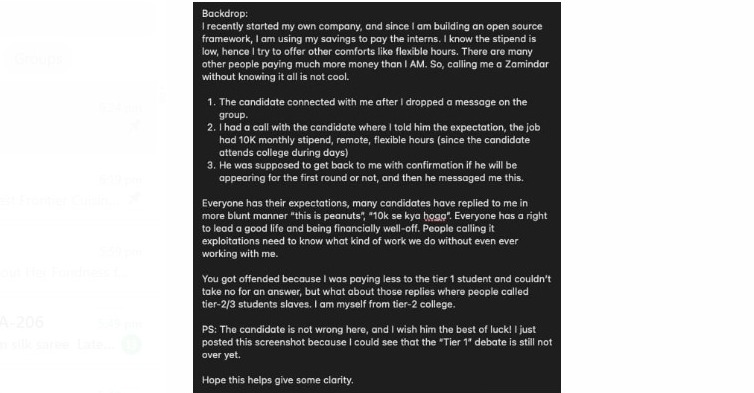Tier 1 College Debate Sparks Online Controversy Over ₹10,000 Internship Offer

Tier 1 College Debate Sparks Online Controversy Over ₹10,000 Internship Offer
A heated discussion over salary expectations raises questions about startup culture and student priorities.
An Indian entrepreneur and software engineer, Vinayak Sarawagi, has found himself at the center of an online debate after offering a ₹10,000 monthly stipend for an internship. The controversy began when Sarawagi shared a screenshot of a WhatsApp exchange with a college student on X (formerly Twitter), where the candidate declined the offer citing their “Tier 1 college” status.
The student wrote:
“I am sorry it won’t work for me being from a Tier 1 college. This is too low for me. Hope you understand.”
Sarawagi responded politely with, “Okay cool,” and later posted the interaction to highlight what he felt was an outdated mindset.
The post quickly went viral, prompting mixed reactions. Some criticized the entrepreneur for offering what they deemed an inadequate stipend, while others debated the entitlement associated with certain college backgrounds.
The Founder’s Defense
In response to the backlash, Sarawagi explained the context behind the ₹10,000 stipend:
• Startup Constraints: Sarawagi is using his personal savings to fund the open-source framework his company is building.
• Flexible Work Conditions: The role offers remote work, flexible hours, and additional perks, especially since most candidates are still in college.
• Transparency in Expectations: The stipend and working conditions were clearly communicated during the interview process.
He further elaborated, “I know the stipend is low. Hence, I try to offer other comforts. There are many other companies paying more than I am. So calling me a ‘zamindar’ without knowing the context is not cool.”
Mixed Reactions on X
The debate intensified after a user commented, “Founder gets sad when someone from a Tier 1 college refuses to join at ₹10,000 per month. Zamindaari nahi jaayegi is desh se (Feudal mindset won’t leave this country).”
Sarawagi responded to such criticisms by pointing out the challenges startups face, particularly in funding interns:
“The candidate is not wrong, and I wish him the best of luck! I posted the screenshot because I noticed the ‘Tier 1’ debate is far from over.”
The incident has reignited discussions about the expectations of Tier 1 college students and the financial limitations of startups. Sarawagi also revealed that several candidates bluntly dismissed the stipend as insufficient, with some saying, “₹10K is peanuts,” or “What kind of work pays this low?”
Despite the backlash, the entrepreneur maintains that the internship provides valuable experience for students still balancing college commitments. The controversy raises critical questions: Should students prioritize prestige over experience? And how should startups balance fair pay with financial constraints?
The founder’s transparent communication and willingness to provide remote flexibility highlight the struggles of running a bootstrap startup. However, the student’s expectations also reflect the realities of job markets where candidates seek opportunities that match their academic achievements.
This incident offers a glimpse into the evolving dynamics between early-career professionals and the startup ecosystem.












